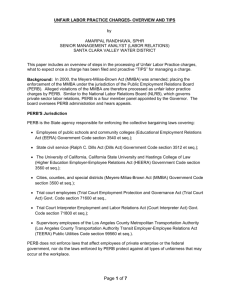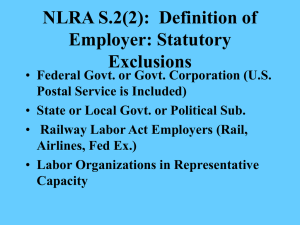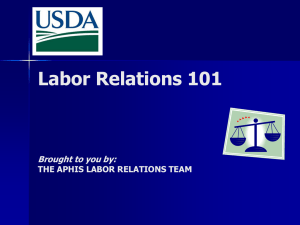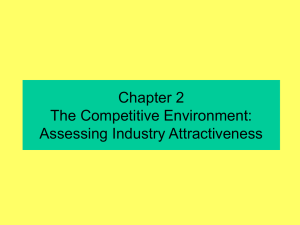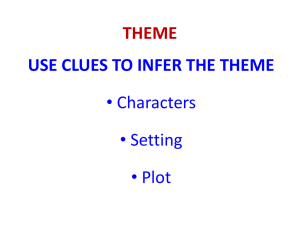Labor Relations and the Meyers-Milias-Brown Act
advertisement
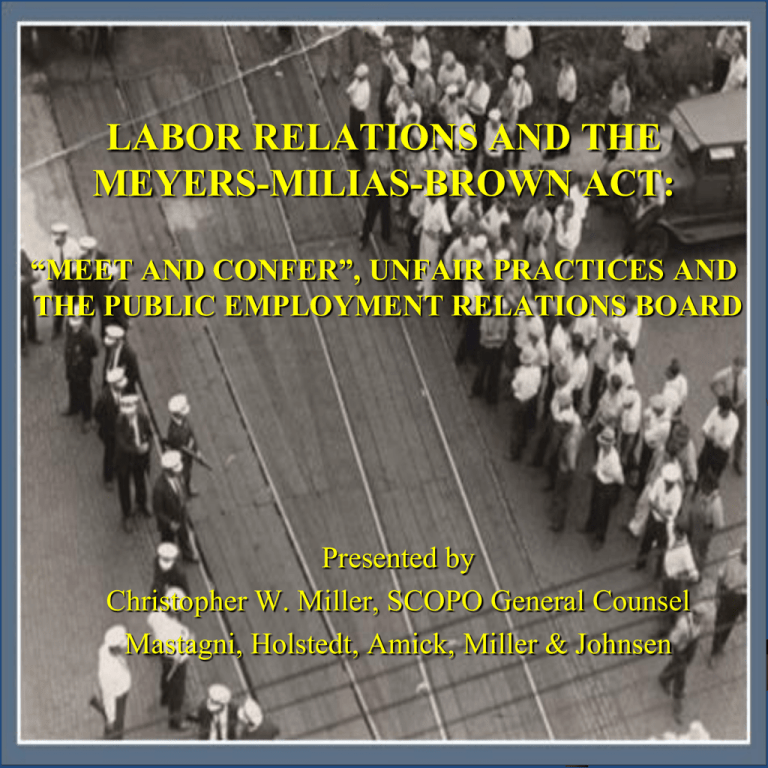
LABOR RELATIONS AND THE MEYERS-MILIAS-BROWN ACT: “MEET AND CONFER”, UNFAIR PRACTICES AND THE PUBLIC EMPLOYMENT RELATIONS BOARD Presented by Christopher W. Miller, SCOPO General Counsel Mastagni, Holstedt, Amick, Miller & Johnsen Introduction Overview of the Meyers-Milias-Brown Act “Meet and Confer” Process Unfair Labor Practices Public Employment Relations Board Remedies MEYERS-MILIAS-BROWN ACT (MMBA) A Look at the MMBA Adopted in 1968 as Gov. Code §§ 3500 et seq. Regulates public employer-employee communications over wages, hours and other terms and conditions of employment Established recognition rights for public employee unions Allows for local rules to govern employment relationship so long as conform to MMBA A Look at the MMBA Statute is one of four major public employment relations statutes in California Purpose: Promote communication, provide dispute resolution process, improve relationship between management and union A Look at the MMBA Establishes right of public employees to form, join and participate in the activities of employee organizations Gives employee organizations the right to represent their members in the employment relationship Scope of Representation: All matters relating to employment conditions and the employeremployee relationship Scope of Representation All matters relating to employment conditions and the employer-employee relationship Wages, hours, “terms and conditions” Wages = salary and benefits Hours = work hours, overtime, leave “Terms and conditions” = everything else Protected Activities Public employees have the right to join and form unions Unfair to threaten reprisals, discriminate, or interfere with the union or “protected activities” Courts have ruled that discriminatory grants of benefits and retaliatory firings are ULPs A Look at the MMBA Requires public agencies to “meet and confer in good faith” regarding wages, hours, and other terms and conditions of employment Provides for agency and REO to prepare an MOU Provides impasse resolution procedures Provides minimum rules on forming REOs Key Decisions County Sanitation v. Los Angeles County Employee Assn. (1985) 38 Cal.3d 564: ruled strikes are not illegal unless they pose imminent threat to public health or safety Firefighters Union vs. City of Vallejo held state courts may refer to National Labor Relations Act cases when interpreting MMBA Strikes and Other Concerted Activities Strikes by public safety are prohibited because they threaten public health and safety Strike before impasse procedures, threats to strike, or using strikes or work slowdowns as a pressure tactic may be deemed an unfair labor practice “MEET AND CONFER” “Meet and Confer” “Meet and confer in good faith” means: mutual obligation to “meet and confer” promptly upon request with representative of other party over matters within scope of representation exchange information, opinions and proposals must allow time to resolve impasses and reach agreement within the budget cycle “Meet and Confer” Meet and confer is different from grievance Employer is required to provide notice and opportunity to meet REO has right to demand meet and confer, request documents, make proposals, render opinions and ideas Not “meet and agree” Impasse procedures apply “Good Faith” “Good faith” under MMBA “requires a genuine desire to reach agreement” (Placentia Fire Fighters v. City of Placentia (1976) 57 Cal.App.3d 9) (Gov. Code § 3505) “The parties must make a serious attempt to resolve differences and reach a common ground.” (Placentia at p. 25.) “Meet and Confer” must “meet and confer” over any change that has a “significant and adverse effect” on wages, hours or working conditions no requirement to meet and confer over policy decisions that do not affect matters within scope of representation Three-Part Test Courts employ a three-part test to determine whether “meet and confer” is required: (1) does the management action have a significant and adverse effect on wages, hours, or terms and conditions of employment? if not, no meet and confer is required if yes, proceed to Step (2) Three-Part Test Courts employ a three-part test to determine whether “meet and confer” is required: (2) is the management action a management right or a fundamental policy decision? if not, “meet and confer” is required “Management rights” are policy decisions that are not within the scope of bargaining because they are intrinsic to the management of the agency; e.g., equipment, duty assignments, specialized units Three-Part Test Courts employ a three-part test to determine whether “meet and confer” is required: (3) if the management action has a significant and adverse effect on wages, hours, or terms and conditions BUT is a management right, Courts employ a balancing test to determine whether “meet and confer” is required Employer’s need to make policy decisions v. Benefit to employment relationship of meet and confer “Meet and Confer” Required “Contracting out” bargaining unit work Changes to work schedule and shifts Change in procedures for filling vacancies Compensation of probationary employees Representation rights in officer-involved shootings “Meet and Confer” NOT Required Implementing racial profiling policy Change in parking fees Use of force policies Decision to implement layoffs; however, agency must “meet and confer” over effects of layoffs and other economic decisions “Meet and Confer” Process Notice by employer of change in matter within scope of representation REO requests to “meet and confer” REO should request information in support of the employer proposal Parties meet, attempt to agree Employer may impose final policy UNFAIR PRACTICES Unfair Practices “Unfair practice” is any violation of MMBA or PERB regulations which interferes with the rights of either party “Unfair practice” includes interference with protected activity as well as failure to bargain in good faith Duty to Bargain Duty to bargain requires agency to refrain from making unilateral changes in wages and working conditions until employer and employee association have bargained to impasse, and this duty continues in effect after expiration of any employer-employee agreement. (City of El Cajon v. El Cajon Police Officers’ Association (1996) 49 Cal.App.4th 64) Unfair Practices Failure to Provide Information Direct Bargaining with Employee Harassment and Threats Interrogation of Employees about Union Activities Discrimination Failure to Provide Information Employer has duty to furnish all necessary and relevant information to a union that requests said information Necessary and relevant information includes documents pertaining to contract negotiations Union can make information requests Bargaining Directly with Employee Employer is prohibited from bargaining directly with employees over wages, hours and other terms and conditions of employment Must discuss matters with union representative only Since employer must negotiate with authorized representative, employees do not have right to file unfair labor practice charge of their own (City of Folsom (2003) PERB Dec No. 1531M) Bypassing the Exclusive Representative Cornerstone of EERA, HEERA, and Dills, is that the union is the exclusive rep of the employees. Once the exclusive bargaining rep has been established, the employer must deal only with that person regarding issues within the scope of bargaining. Example: company contacts individual to determine working conditions. Bad Faith Bargaining Bad Faith Bargaining/Failure to Meet and Confer Unilateral changes to terms and conditions of employment when MOU in effect Unilateral changes where contract expired and still bargaining Bad Faith Bargaining/Surface Bargaining Illusion of Bargaining in Good Faith Bad Faith Bargaining Bad Faith Bargaining/Surface Bargaining: Unlawful bargaining table conduct designed to create illusion of good faith bargaining but without the requisite intent to agree Evidenced by: Refusal to act on proposals or introduce counterproposals Making proposals contingent on withdrawal of grievances or unfair practice charges Reopening previously settled issues Dilatory conduct in scheduling and attending negotiations Harassment and Threats Employer cannot interfere with, intimidate, restrain, coerce or discriminate against employee for exercise of union rights Union representatives cannot be punished or denied promotion based on lawful activity Employer can regulate union access to employee work areas Interrogation Employer cannot interrogate union members about union activities Employer cannot ask who posted messages on the Union bulletin board Cannot ask members about the status of negotiations Cannot ask members about what the union is planning to do with respect to union activities Cannot ask if employee is for or against union Discrimination Campbell Municipal Employees Assn. v. City of Campbell (1982) 131 Cal.App.3d 416: Employer may not discriminate by denying pay benefits to employees represented by union that used impasse procedures. San LeandroPolice Officers Assn. v. City of San Leandro ((1976) 55 Cal. App.3d 553: Employer may not grant benefit only to employees not represented by union. Union ULPs Breach of duty of fair representation Work stoppages or slowdowns Bad faith bargaining Violation of fair share rules Employers rarely file unfair practice charges Duty of Fair Representation Primary union ULP issue REO must fairly represent all employees, even non-union employees (fair share) Union conduct cannot be arbitrary, discriminatory, or in bad faith PUBLIC EMPLOYMENT RELATIONS BOARD (PERB) PERB Public Employment Relations Board administers the MMBA and similar statutes governing the public sector employment relationship PERB did not administer MMBA until 2001 PERB jurisdiction is expanding MMBA has been interpreted primarily by courts PERB Jurisdiction Limited to resolving claims of unfair practices which violate the MMBA No jurisdiction over peace officers defined in Section 830.1 of the Penal Code PERB does not enforce collective bargaining agreements per se PERB will not issue a complaint unless the violation constitutes an unfair labor practice, not solely an MOU violation Statute of Limitations An unfair practice charge must be filed no later than SIX MONTHS from the date the Charging Party knows, or should have known, of the conduct underlying the charge Late-filed charges are subject to rejection or dismissal The PERB Process The PERB Process Filing a Charge (What is Needed): Name of affiliate Association Dates when alleged violation occurred Detailed description of the violation Names of the Union members involved in the violation Names and titles of the supervisors/managers involved in the violation Names of all witnesses The PERB Process Unfair Practice Charges PERB Regulations MMBA Provisions Charges can be Filed Online, In Person or by Mail PERB Charge is Filed by Counsel The PERB Process PERB does preliminary investigation If charge fails, PERB issues a “Warning Letter” and allows time to correct Employer may respond to the allegations Board Agent will determine if charge meets minimum legal standard for violation If deficiencies are not corrected the charge will be dismissed Union may appeal dismissal to the full Public Employment Relations Board The PERB Process Abeyance: Where the MOU prohibits the conduct and the parties have binding arbitration as the final step of their grievance procedure, PERB can place the charge in abeyance After arbitration PERB can dismiss the charge unless the Charging Party shows that the arbitration award is repugnant to the MMBA The PERB Process PERB issues a complaint if there is prima facie (“at first view”) evidence of a violation Informal Settlement Conference A PERB agent acts as a mediator and attempts to facilitate a resolution If no resolution of charge, PERB sets a date for an administrative hearing PERB Process Administrative Hearing Charging Party has the burden of proving its case by a preponderance of the evidence Parties may call witnesses and introduce documentary evidence Witnesses testify under oath and may be examined and cross-examined Parties may present oral closing arguments or submit post-hearing briefs PERB Process Following submission of all evidence and argument, the administrative law judge (ALJ) issues a proposed decision Proposed Decision is Endorsed, Modified or Rejected by the Board Remedies Must Promote the Purpose of the MMBA Remedies Issue Notice Posting Return to Status Quo Return to Bargaining Table Provide Requested Information Any other Remedy that would effectuate the purpose of the Act PERB cannot force employer to accept Union’s contract proposals Conclusion Legislation may remove mixed units from PERB’s jurisdiction PERB charges are most useful when the employer respects the process Injunctive Relief is a “Non-Starter” PERB is a tool with a dull edge QUESTIONS?
